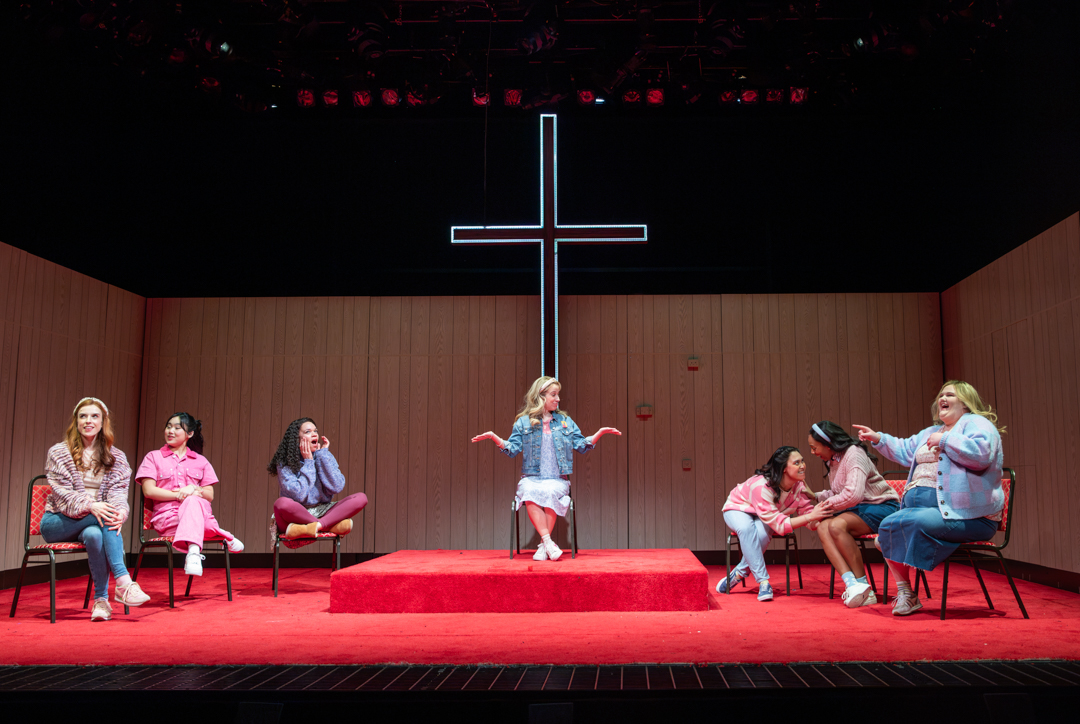When I heard I could get a ten dollar student ticket to a brand new horror-comedy musical about a girl with a second set of teeth down there, I had no idea what to expect. Walking into this, I was aware of the 2007 cult-classic horror film “Teeth” and was curious to see how the Pulitzer Prize- and Tony-winning writing team Michael R. Jackson and Anna K. Jacobs would put this film on its feet.
“Teeth” follows Dawn O’Keefe (Alyse Alan Louis), the star member of Christian youth group, the “Promise Keeper Girls.” Under the guidance of her abusive youth pastor and stepfather, Bill O’Keefe (Steven Pasquale), she made a vow of abstinence in an effort to remain pure. As Dawn reckons with her years of repression and grooming by her stepfather following her mother’s passing, she embarks on a tumultuous journey of sexual discovery where she learns that as men try to violate her, her body bites back — literally. Dawn’s stepbrother, Brad O’Keefe (Will Connolly), the first to experience Dawn’s strange powers in a kiddie pool incident that occurred during their childhood, catches on when the death of her boyfriend, Tobey (Jason Gotay), sets off a growing trail of victims.
The new musical is set in 2023, as opposed to the original movie’s setting in 2007, which in many ways added to the themes the creative team tackled. For example, Brad donning a virtual reality headset to log onto his online support group, the “truth seekers,” was a direct commentary on internet subculture — specifically, a subgroup commonly referred to as “incels.” If you are not familiar with the term, the Cambridge dictionary defines an “incel” as “a member of a group of people on the internet who are unable to find sexual partners despite wanting them, and who express hate toward people whom they blame for this.”
I found it interesting how this show highlights these subgroups as a form of escapism. This subplot stands out among a trend of shows with similar focuses like “Be More Chill” (2015) or “Dear Evan Hansen” (2015) by addressing the internet from a humanizing perspective. The dialogue between the “truth seekers” was expressed as troubled individuals having (albeit weird and misogynistic) personal conversations, which is a part of the internet that is widely misrepresented by other shows that portray it as a void where human connection goes to die.
In addition, it is hard to complain about whether something is realistic when so much of this musical has a larger-than-life, camp-to-the-max air to it. The aesthetic is largely due to a killer design team, as many aspects of the show were intentionally anachronistic. The set and youth group costumes show no traces of modernity in contrast with the many modern pop culture and internet references sprinkled into the dialogue, effectively pointing out the backward nature of the concept of virginity and modesty in a modern-day United States. Not to mention the amount of work put in to provide the special effects necessary to sell the gore, because after all the musical is still a horror show.
Parts of the show left me confused about whether I was supposed to laugh or cry, which was slightly uncomfortable considering the sensitive subject matter.
As a huge fan of shows like “Spring Awakening” (2006) and “Dogfight,” (2012), I was delighted to hear a soundtrack with a similar combination of angsty singer-songwriter power ballads to cry to and camp-tastic ensemble bops that you can tap your toes to while you wipe away tears.
One critique for the writing team is to be more decisive for the tone of each song. One song that really stood out, “It’s Always The Woman,” took on some intense subjects of sexual violence and victim blaming. The track could have been all the more poignant if the writers cut down on some of the more humorous lyrics. I was moved by the overall theme of the song, and thoroughly impressed by the stunning vocal technique and acting of Louis. However, parts of the show left me confused about whether I was supposed to laugh or cry, which was slightly uncomfortable considering the sensitive subject matter.
On the other hand, a song that hit the balance between hilarity and social critique almost flawlessly was a duet between Dawn and her boyfriend Tobey, “Modest is Hottest.” Two repressed teens singing about how each other’s religious devotion to modesty and purity is what they find most attractive in one another (while simultaneously failing to keep themselves off each other) was delightfully ironic. I have to give a nod to choreographer (Raja Feather Kelly) and intimacy coordinator (Crista Marie Jackson), both noted in the show’s program, because it’s apparent this team created a comfortable rehearsal environment by how fearless the actors were in providing the audience with this outlandishly raunchy physical comedy number.
This horror-comedy (could be one or the other, depending on how afraid you are of castration) is full to the brim with cackle-worthy, gut-wrenchingly gory and shamelessly raunchy humor. What the story lacks in its overall narrative structure, it makes up for in its over-the-top campiness and undeniable entertainment value. I cannot say with complete confidence that this musical is for everyone, but there are certainly people who, for whatever reason, whether it be religious trauma or passionate misandry, this musical would really hit the spot.

